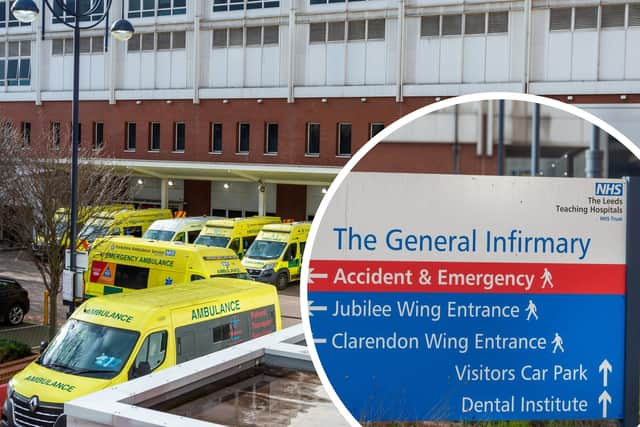Leeds NHS apologises to Muslim and Jewish communities after delays releasing bodies from hospitals for funerals
and live on Freeview channel 276
Burials of people from both faiths traditionally take place within 24 hours of their death.
But staff pressures at Leeds General Infirmary (LGI) and St James’ Hospital mean families are struggling to secure the timely release of their loved ones’ bodies from mortuaries outside of regular working hours.
Advertisement
Hide AdAdvertisement
Hide AdOne Muslim councillor said she was getting “panicked” phone calls from grieving families over the issue at weekends.


Leeds Teaching Hospitals NHS Trust (LTHT), which runs both LGI and St James’, said it was “sorry for the poor experience” some families have had. A senior figure at the trust said the delays were being caused by “enormous” and “sustained” pressures across frontline care, as the issue was discussed at a council health scrutiny committee on Tuesday. Councillor Salma Arif, Leeds City Council’s portfolio holder for public health, told the meeting: “I do think there’s a problem with the service and that to me is evidenced by the number of phone calls I get on a weekend.
“That has really gone up in the last few months.
“I represent Gipton and Harehills. There’s a large Muslim population there and there’s always a lot of panic around that time on weekends, from residents saying, ‘We’re not able to get the body released’.”
A statement had earlier been read out at the meeting on behalf of Simon Phillips, interfaith director at the Leeds Jewish Representative Council.
Advertisement
Hide AdAdvertisement
Hide AdThat statement, read out by Councillor Mohammed Iqbal, said: “The provision of out-of-hours bereavement services for Muslim and Jewish communities are critical in ensuring we can exercise our religious responsibility to bury our dead without delay. This is particularly important at weekends, when we know cover may not be as widespread as during the week.”
Mr Phillips’ statement said “recent changes seem to have made matters more difficult” and that he would welcome talks with hospital chiefs on how to improve the situation.
During regular weekday hours, mortuary staff are able to process the release of a body. On evenings and weekends, when those staff don’t work, the process is overseen by a clinical site manager, of which there is only one at each hospitals.
Dr John Adams, LTHT’s medical director for governance and risk, told the meeting: “Up until probably a year ago or so, that (system) has worked pretty well.
Advertisement
Hide AdAdvertisement
Hide Ad“The difficulty we now have is the clinical site manager is often not in a position to facilitate the release of a body, because of other operational pressures.
“That can lead to difficult situations where they’re trying very hard to juggle a number of balls at the same time, and to release a body in a timely fashion, while dealing with other matters that are going on in the trust at that time.”
Dr Adams said the trust was considering moving to an 8am to 8pm bereavement service that would operate from Monday to Sunday. Although it theoretically runs a 24/7 service at present, this isn’t being delivered in practice because the clinical site managers are so stretched. Dr Adams thanked both Councillor Arif and Mr Phillips for their “useful feedback” and said he was “sorry for the poor experience” some families have had.
But he warned that national legislative changes in how bodies are examined after death are a “potential concern”, which may hamper the NHS’ efforts to improve releases. From April, medical examiners will be required to scrutinise all deaths that are not passed onto a coroner, before the body is released.
